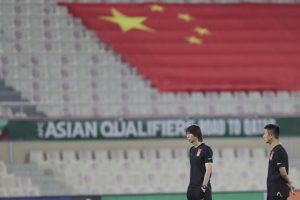Even with 1.4 billion people, China can’t find 11 solid soccer players.
China is missing out on the World Cup again despite spending millions — probably billions — to develop the game, a reported priority of Xi Jinping, the all-powerful general secretary of the Chinese Communist Party.
To underline the humiliation, smaller neighbors Japan and South Korea have had sustained success with high-profile players scattered across Europe. South Korean forward Son Heung-min, for example, has become one of the world’s best scorers at English club Tottenham.
China’s abysmal record is startling, particularly compared to the Summer and Winter Olympics, where it’s always near, or atop, the medal table.
China has played only once in the World Cup, and that was in 2002 when it lost all three games and failed to score a single goal. The appearance, however, was monumental. Bora Milutinovic, who coached the national team, was affectionately called “Milu” and treated like a national hero.
“China is bigger than most things, so China is used to doing things on its own terms,” said Cameron Wilson, a British journalist who has lived in China for almost two decades and is the founding editor of the website “Wild East Football.”
“Football is one of the few things in the world that is bigger than China,” Wilson told The Associated Press. “And I think that is where the problem comes in because they are not able to make the fundamental changes that are necessary.”
A year ago on the website, Wilson wrote about China’s top-down bureaucratic system and how it has hindered soccer’s development — both for the national team and its failing domestic league, the Chinese Super League.
“In short — Chinese football is simply not about football. It’s about politics, business, and self-interest,” Wilson wrote. “These things are of course far from absent elsewhere. But in China they are all-dominating, because the ecosystem … is not designed for passion and love for anything not related to the bottom line.”
Wilson puts part of the blame on China’s “hyper-competitive society” where soccer is a low priority for kids faced with mounds of homework who live in dense urban areas with few soccer fields and little time to play. It’s also an activity largely out of the mainstream, which is a disadvantage in a conformist society like China.
Wilson noted that countries like the United States, Japan, and South Korea are also non-traditional soccer nations, but they have developed strong domestic leagues. China has not. The Super League has long been filled with corruption, splurges of spending, a carousel of changing coaches, and money interests and sponsors put ahead of the soccer.
China’s zero-COVID policy has basically shut down the league, which has wasted millions on foreign coaches and aging foreign players who have used the league as a holiday destination.
In 2016, Argentine striker Carlos Tevez signed a two-year deal for $40 million with Shanghai Shenhua. He scored only four goals and eventually returned to his boyhood club in Buenos Aires, Boca Juniors. He was quoted in Argentina calling his stay in Shanghai his “China vacation.”
Wilson noted that the Chinese soccer association — the body that runs the sport in China — is an arm of the government and does not operate independently as similar bodies do in England or elsewhere. It’s part of the General Administration of Sport, a government agency.
“The evidence is extremely strong that a successful domestic league is a strong component of a national team,” Wilson told the AP.
In the FIFA rankings in August, China was No. 78 — one ahead of the tiny African nation of Gabon, and just behind Central Asian nation of Uzbekistan.
“FIFA rules stipulate very clear[ly] that football associations should be run free of political interference,” Wilson said. “The people who are running football in China are not football people. They’re politicians and administrators who do not understand the ethos of the game.”
Wilson used the example of Chinese player Wu Lei, who played for several seasons in Spain with Espanyol. He’s also been a standout on the national team.
“There are players who are pretty decent like Wu Lei,” Wilson said. “He wasn’t amazing but he showed he had the ability to play at that level.”
So there is hope.
China’s population and state-run training academies have been used to produce swimmers, divers, volleyball and basketball players, gymnasts, table tennis players, and more. The list is long. But soccer does not seem to fit into the development model.
“There are 1.4 billion people, but hardly anybody plays football,” Wilson said. “It’s a tiny proportion of the population. So that takes away the population advantage.
“The Chinese think they have some special advantage because they can and control resources in a way that other countries can’t,” Wilson added. “But it’s not working out that way. They put all their eggs in one basket, and they keep dropping the basket.”

































